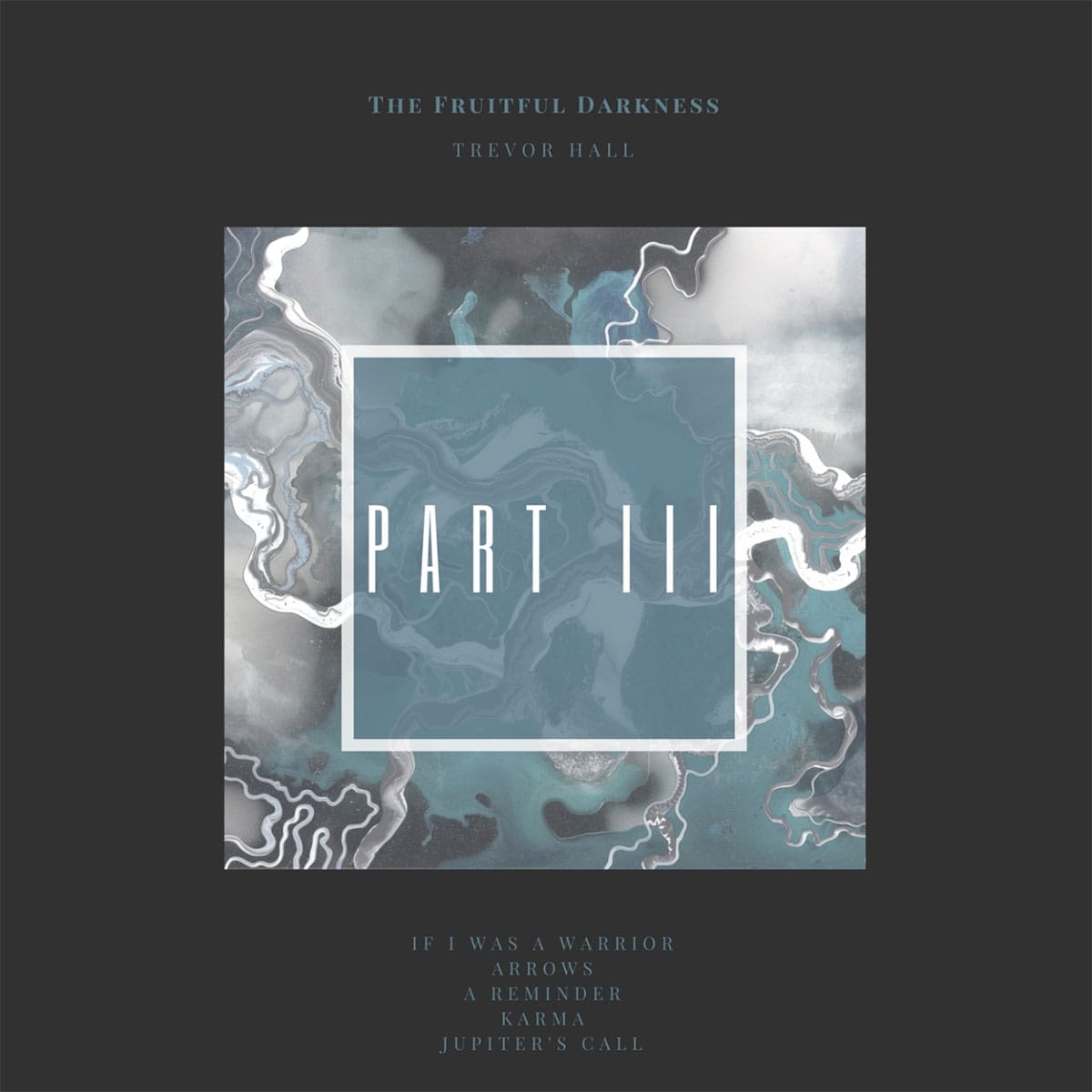In the middle of recording his latest album, singer-songwriter Trevor Hall picked up Zen Buddhist teacher Roshi Joan Halifax’s book, The Fruitful Darkness. Halifax’s reflections on the Buddhist path and the shamanic journey immediately spoke to Hall’s own difficult walk through darkness — the fruits of which he knows well.
The Fruitful Darkness, published over 20 years ago, is a deep study of shamanism, Buddhism, tribal wisdom, and the connections between. While writing an album reflecting on the wisdom he’d gained navigating a period of hardship, Halifax’s message was the very guidance Hall needed.
“The book really helped me finish the album,” Hall said in an interview.
In The Fruitful Darkness, Halifax writes:
Both Buddhism and shamanism are based in the psychological grammar that says we cannot eliminate the so-called negative forces of afflictive emotions. The only way to work with them is to encounter them directly, enter their world, and transform them. They then become manifestations of wisdom. Our weaknesses become our strengths, the source of our compassion for others and the basis of our awakened nature.
When it came time to title his record, Hall knew he wanted the album to share the same name as Halifax’s book. He wrote to Halifax, who serves as the Abbot of Upaya Zen Center, requesting her permission to title his project The Fruitful Darkness.
“She wrote me back such a Zen koan response,” says Hall. “It was something like ‘Dear Trevor, If you want to use the title, you can use it, but I don’t think you should use it… but I’ll leave it up to you.’ It was like a puzzle.”
Hall went ahead with the title for his album, which echoed many of the book’s themes in its lyrics.
On the title track of the album, Hall sings:
The dark within my dark
Is where I found my light
The fruit became the doorway
And now it’s open wide
The fruitful darkness
Is all around us
Halifax’s The Fruitful Darkness landed in Hall’s hands almost by accident.
While visiting his wife, photographer Emory Hall, as she completed a month-long yoga-teacher-training in the Catskill Mountains of New York, the two took a drive to a local bookstore to have a cup of tea. As they browsed the shelves, the cover and title of Halifax’s book caught Hall’s eye.
‘I feel his music will bring more people into the heart of what I was writing about,’ says Roshi Joan Halifax.
Months later, in the middle of working on his album, Emory began reading the book that had sat on their shelf since the Catskills. She was amazed by Halifax’s reflections and urged Hall to read the book himself. She reminded Hall that they’d actually met the author — an encounter Hall had completely forgotten — while visiting their friend, spiritual teacher Ram Dass, at his home on Maui years prior.
“It all came full circle,” says Hall. “It was such a surprise.”
Halifax says Hall’s request to name his album after her book was an unexpected one.
“I was so surprised to get Trevor’s request,” Halifax told Lion’s Roar, “I was honored and delighted. The book was very powerful for me to write, and it is still cherished and appreciated by many. I think it is even more relevant today.”
“I feel the message in the book serves, and that his music will bring more people into the heart of what I was writing about… I hope the book brings people to his music,” she says.
Halifax’s The Fruitful Darkness is a profound travelogue of her journeys through Asia, Europe, Africa, and North and South America. In it, she shares the wisdom she gained from living in deep wilderness and with the tribal peoples of many cultures. Halifax tells of her time with Mexican shamans and sorcerers, Native American elders and medicine people, and many others.
Hall found himself feeling alone in the dark, filled with doubt, asking ‘Who am I? What do I believe?’
Throughout the book, Halifax returns again and again to the message of the shamanic journey — a spiritual journey of learning to befriend darkness rather than push it away, as Westerners tend to do. Shamans, Halifax notes, develop mystical abilities by surrendering to darkness and that which attacks them.
“By being receptive to their enemy,” she writes, “They receive the medicine of adversary. The enemy becomes their ally.”
Hall’s The Fruitful Darkness tells the story of his own journey through darkness in song. Nearly three years ago, his health deteriorated as the result of a staph infection, leading to his hospitalization and many canceled tour dates.
“I was having so many health problems. I wasn’t able to tour, and I was slowly being stripped of my identity as a musician,” says Hall.
Hall says he became completely disconnected from the beliefs and inspirations he had previously based his life on. As his idea of himself crumbled, he found himself feeling alone in the dark, filled with doubt, asking “Who am I? What do I believe?” It was a feeling he couldn’t shake.
In an astrology reading, Hall was told that this period of time was his “Saturn return” — an astrological concept which refers to a period of time that occurs just before the age of 30, bringing with it a serious wake-up call. Though Hall was a once a skeptic of what he calls the “hocus pocus” of astrology, the reading inspired him to weave cosmic themes of stars, planets, and the wisdom within them into The Fruitful Darkness.
Raised in South Carolina, Hall recorded his first album at the age of sixteen. As a teen, he left his home state to attend Idyllwild Arts Academy in California. At Idyllwild, Hall studied classical guitar and was introduced to the practies of yoga and meditation. Since his late teens, Hall’s own spiritual practice has been rooted in Hindu tradition, which holds great influence in his life and music.
“It all started with Neem Karoli Baba,” — the late Hindu guru, says Hall. “Just seeing his picture and feeling like I’ve known this person my whole life. It was that familiar feeling. A heart feeling. It went beyond all reason.”
His interest in Neem Karoli Baba led Hall to a number of other influences. For several years, when he wasn’t on tour, he lived in a Kali temple in Laguna Beach, and went on a pilgrimage to India, where he continues to travel annually. When he discovered the Indian mystic and yogi Sri Ramakrishna, a devotee of the Hindu goddess Kali, Hall felt a deep connection to the idea of a higher power being a feminine energy — a “mother.”
I stick with one core practice, but I stay open to everything.
Though he maintains a root spiritual practice in Hinduism, Hall also draws inspiration from many different traditions, including Buddhism.
“I found that, as much as I tried to force myself into one thing, it just wasn’t me,” says Hall.
“I stick with one core practice, but I stay open to everything.”
Before she chose Zen Buddhism as her ultimate path, Halifax studied shamanism and Buddhism in parallel for several years. This respect for spiritual traditions differing from her own is an aspect of Halifax’s The Fruitful Darkness that Hall also resonated with.
“I would never have put Zen Buddhism with all of these shamanic practices, let alone more than one shamanic practice,” says Hall.
“Roshi Joan was with the Huichol. She was with Nepalese shamans. She was with Native American shamans. Without her exploration, we would miss out on all the medicine that she’s provided us,” he says.
“She’s just a boss. She’s my role model.” he says.
Hall’s music is similarly heterogeneous. It’s difficult to place his body of work into a specific genre. His music unites qualities of roots, folk, and reggae, among other influences, and his lyrics are often devotional. Throughout his previous studio albums, Hall sings of travels to faraway lands and a reverence for the Earth and spirit. He promotes themes of unity and spiritual healing, and occasionally incorporates Sanskrit chanting. He sees song as a manner of storytelling, and The Fruitful Darkness is no exception.
It’s been a journey to get to this point. The spiritual path is like a razor’s edge.
After 15 years in the industry, working with multiple record labels, Hall crowdfunded through Kickstarter to create The Fruitful Darkness, his eighth studio album, and first independent release. Hall chose to release the album in four separate parts over the course of year, beginning in August 2017. Three parts of the album have already been released, with the fourth slated to come in June. This gradual process is intended to allow his audience to fully experience each track


Halifax, who Hall says he hopes to meet again, says she has listened to Hall’s The Fruitful Darkness with gratitude.
“I have listened with great appreciation to the album,” she says. “The lyrics capture what the book is about, that journey into the darkness and the gift that can be found there.”
Hall’s fanbase, who he affectionately refers to as “The Villagers,” have also taken to Halifax’s The Fruitful Darkness. On Hall’s most recent tour, fans have come up to him with copies of Halifax’s book, asking him to sign it.
On “Arrows,” the eighth track Hall has released from The Fruitful Darkness, he sings:
The dark is all around me
But I’m so glad it found me
“It’s been a journey to get to this point,” says Hall. “The spiritual path is like a razor’s edge. Every tradition says that — Buddhist, Hindu, Christian, Jewish. It’s not a walk in the park.”

